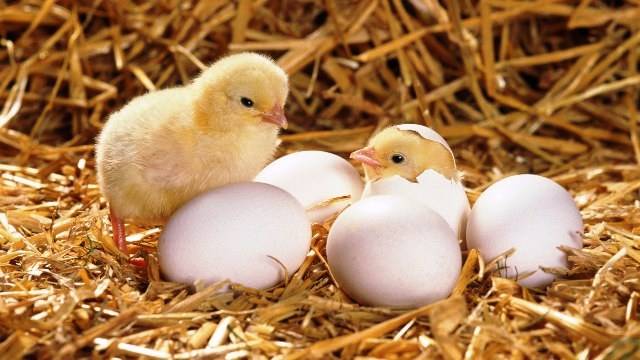
Eggs laid by hens without mating the cock will not hatch since they are sterile and lack a germ to develop into a chick. By rapid development and transformation within an egg, a minute germ can be converted into a chick in 21 days. All of a hen's eggs are unfit for hatching. Suitable eggs for hatching should be carefully picked on the following criteria.
Fertility
Fresh eggs collected from healthy and well-matured hens between 5- 7 days after mating and within 2 days of separating the cock will be fertile enough to hatch. Eggs taken quickly after letting in the cock for mating or long after the cock has been separated may not be fertile.
Egg size and shape
The size of the eggs used for hatching is important since the size of the hatched chick is strongly dependent on the size of the egg. Depending on the breed, the eggs for setting should be neither too large nor too small. It is always preferable to choose eggs weighing about 58 g each. Eggs that are uniform in size and shape are preferable.
Eggshell
The eggshell should be equal in thickness, texture, and color so that warmth can spread uniformly throughout incubation. In the case of white-shelled eggs, all eggs for incubation should be tint-free. Medium and dark brown eggs hatch faster than light brown eggs when it comes to brown eggs. Low hatchability occurs when the shell texture is poor due to a calcium or vitamin D deficit. All eggs should be checked for cracked shells before being utilized for incubation.
Egg quality
Eggs should be gathered as soon as possible after laying, preferably within a week of lying, to ensure that they are fresh and not stale. Fresh eggs laid on the day of setting should not be set unless they have reached room temperature before being set. Eggs that are 2 to 4 days old are ideal.
Deformity
Eggs with ridges, encrustations, projections, depressions, cracks, or stains should not be chosen. Very thin shells may break during rotating and fail to maintain a consistent temperature for the embryo's development. If the shell is too thick, the chick will struggle to chip it with its fragile beak and escape.
Soiled egg
Soiled eggs should not be washed in water before setting since doing so opens up the pores and interferes with the hatching process. If the dirt is not too thick, it should be removed with a knife. Eggs that have been heavily stained should not be utilized.
Storage
To achieve the best results, eggs collected for setting should be kept in a dry, cold, and airy environment. Eggs should not be kept for more than three days in hot temperatures, although they can be maintained for up to ten days in cold weather or on hillsides.
As eggs absorb odor very easily, it is not good to store them near smelly substances like onion, garlic, kerosene, etc. Eggs should be stored in a cool place with the broad ends up. Eggs shaken very much during transport will not be good for hatching.
(Also read: How To Start Successful Poultry Farming Business)









